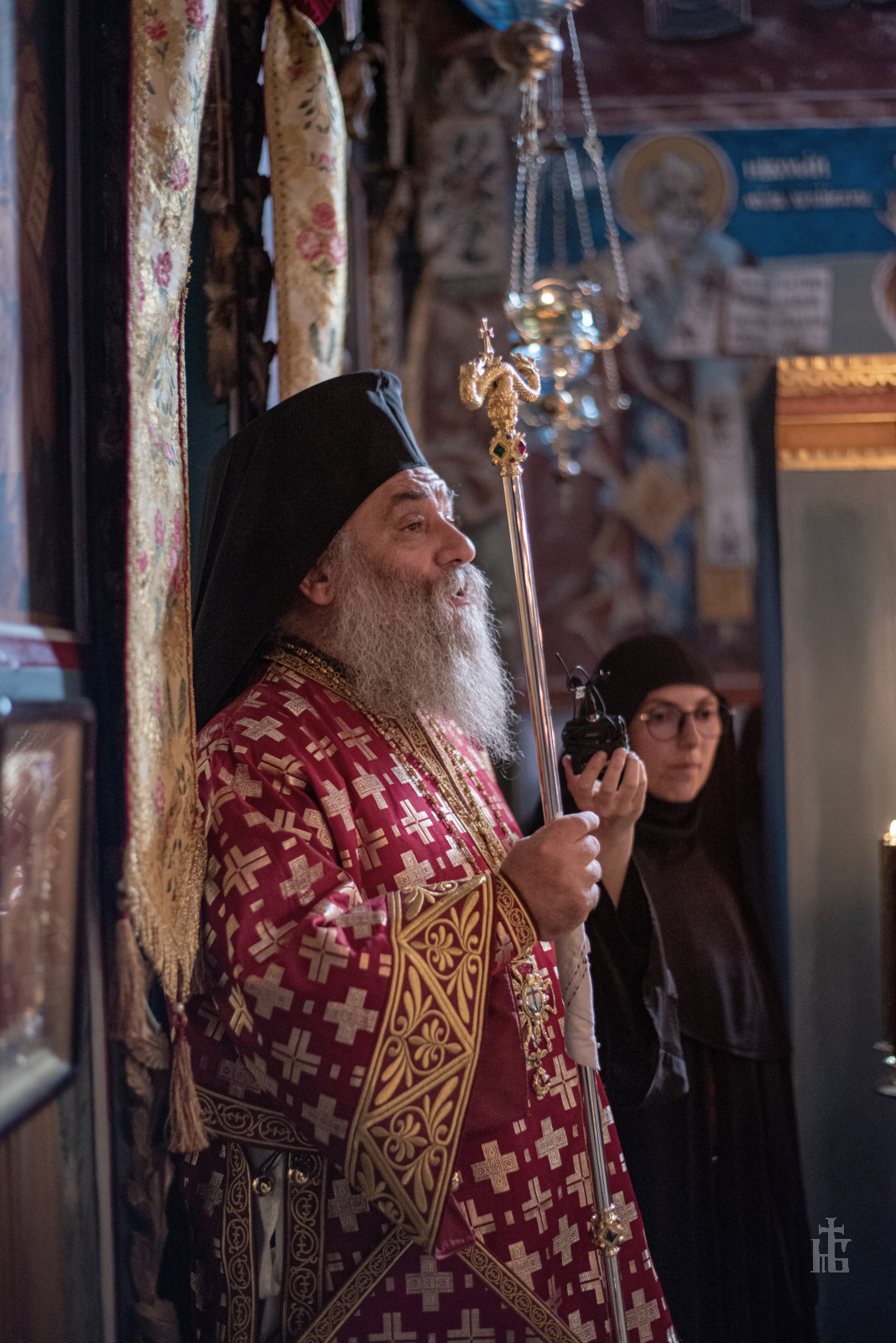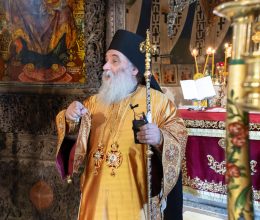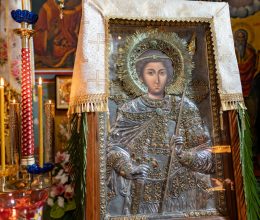Sermon of His Grace, Bishop Partenij of Antania, Abbot of the Holy Monastery of Bigorski, delivered at the Divine Liturgy following the reading of the Holy Gospel, on the Ninth Sunday after Pentecost, in the Church of the Great Martyr George the Victorious at the Monastery in Rajchica, on July 25/August 7, 2023
In the name of the Father, and of the Son, and of the Holy Spirit!
The Lord Christ, my beloved ones, speaks to all of us through His Gospel, saying: “Do not fear, for I have overcome the world” (John 16:33). It is always good to keep these words in mind, for it is impossible to live without troubles and afflictions in our daily life. Each of us carries a cross. We are struck by the winds of various passions and trials. Yet here, the Savior tells us: “Do not fear.” And He continues: “Peace I leave with you; My peace I give to you; not as the world gives do I give to you. Let not your heart be troubled, neither let it be afraid” (John 14:27). He is our peace, our rest, the blessed inner stillness for which we all yearn.
In today’s Gospel reading, where Christ walks upon the sea, we see in the person of the Apostle Peter the human yearning for the supernatural, for transcendence, for the Divine. Although according to logic and natural laws it is impossible for a human being to walk on water—something only God can do—today we witness something paradoxical to the ways of this world. In the early hours of the morning, in the midst of a stormy sea, after a night spent in fear and struggle for survival, the Apostles suddenly see their Divine Teacher coming toward them, walking on the water. At first, they thought they were seeing a ghost. But Christ reassured them: “Take heart; it is I; do not be afraid” (Matthew 14:27).
In the midst of such uncertainty, the Apostle Peter resolutely called out to Christ: “Lord, if it is You, command me to come to You on the water!” (Matthew 14:28). Peter simply longed for the One who stilled the sea, the One who calmed the storm. He sought the true peace and yearned for the Divine. And while he kept his gaze on Christ, he walked peacefully on the water. But the moment he turned his eyes away from the Teacher, doubt filled his heart, fear overcame him, and he began to sink. What frightened him? The wind and the waves of the sea.

All of us, beloved, experience fear on the sea of life. We tremble at the winds of afflictions and the waves of temptations that often confuse and disorient us. Therefore, Christ must always be our unchanging point of orientation—the One who said: “I am the Way, the Truth, and the Life” (John 14:6). Whoever follows this path walks toward true peace, toward a quiet harbor, toward eternity and Divine life.
The endeavor of the Apostle Peter teaches us that we were made to be with God. Our souls thirst for God—they cannot live without Him. Just as Peter could not bear to be without Christ, so he hurried toward Him, even upon the water. Naturally, this was contrary to human logic, which would tell him that such a thing is impossible. But Peter’s powerful yearning for Christ and his ardent desire for the Divine surpassed the logic of this world.
My beloved ones, whenever troubles and temptations assail us, let us fix our gaze on the One who says to us: “Do not fear, for I have overcome the world” (John 16:33). Yes, it is true: sometimes it seems illogical that certain afflictions and struggles can be overcome. But with Him—the Conqueror—everything can be overcome. “All things are possible to him who believes!” (Mark 9:23), says the Lord Himself. When the Apostle Peter turned his gaze and his faith away from Christ, he began to sink. Yet Christ was near and stretched out His hand to him. Christ is always near us when we face trials.
In the case of the Apostle Peter, we see that it is human to fall, but it is also human to always seek Christ. Both the Gospel and the Life of Saint Peter show us that Peter constantly sought Christ and ran toward Him, without concern for the consequences, without relying on the opinions of others or the logic of the crowd. Although, as a man with weaknesses, Peter was also overcome by temptations and fell—such as when he denied Christ three times—he nevertheless continued to seek Him. When he heard that Christ had risen, Peter ran fearlessly to the tomb, seeking Him. And today, when he began to sink into the sea, he immediately called upon the only true helper of humankind: “Lord, save me!” (Matthew 14:30). And the Lord pulled him from the whirlpool of the sea, gently reproaching him: “O you of little faith, why did you doubt?” (Matthew 14:31).
Walking upon the water must be understood symbolically, as a metaphor for overcoming this world—with God’s help, of course. For conquering the world, its elements, and the powers that rule it, is neither easy nor logical, because Christians are called to struggle even against natural passions, through fasting, prayer, and self-restraint, thus ascending toward God. Through Christian asceticism and the operation of Divine grace, we overcome even our own nature, which pulls us toward earthly things, sin, and the desires of this age. The Apostle Paul also teaches us this, saying that we must daily cast off our old self, which is corrupted by deceitful desires, according to the fallen nature of Adam, and instead clothe ourselves in the new self, created according to God in true righteousness and holiness, following the example of the New Adam—Christ (cf. Ephesians 4:22-24).
Christ, then, is the model for what it means to be truly human. If someone desires to become human in the truest sense, according to God’s definition of humanity, their example should not be the first-created Adam—who was deceived by bodily desires and fell—but rather Christ, who overcame the world.
Therefore, beloved, to be with Christ means to be lifted above this world, to dwell with our spirit in the Heavenly Kingdom, which is Christ Himself. Whoever has gained Christ has already acquired eternity and begins to experience eternal bliss even here on earth. It is true that, according to rational logic, striving to conquer all passions may seem like foolishness. People of this age cannot understand how a young person, living in a time of such comfort and opportunities, would choose, for example, to become a monk. They marvel at how someone can abstain from everything—especially from marriage and from desires that seem perfectly natural and normal to the world.
Yesterday, I was speaking with the monks, explaining that when a person embarks on the path of following Christ, surrendering entirely to Him, they are doing exactly what the Apostle Peter did: they walk upon the waters, overcoming the logic of this world and, for a moment, even their fears—because they have the Conqueror, Christ, before them. The same occurs when a young person is called to monastic life: they are driven by a powerful desire for the Divine, for holiness, and they leave everything behind. In that moment, when someone sets out on the monastic path, they receive a special blessing, a strength from God. However, soon after, the winds of temptations inevitably arise. If the monk even slightly turns his inner gaze away from Christ and becomes frightened by the spirits of wickedness, by his sinful nature, or by his desires and passions, he will begin to sink.
Without God’s grace, man is a fragile and powerless being, incapable of such a battle on his own. Christ’s help, His saving hand, is essential to lift us out of the abyss when we begin to sink. Whether you are a monk or a Christian living in the world, know that only Christ can help you, strengthen you, and save you. When the gaze of your soul is fixed on Him, with the whole longing of your being, then you resemble the Apostle Peter walking supernaturally upon the sea, defying the laws of gravity.
Thus, we also overcome the pull of passions, desires, and temptations whenever we keep our eyes fixed on Christ. We surrender ourselves entirely to Him, with all our heart and being, as to the only true source of hope and strength, as to the Father who loves us more than anyone. Let us continually ask Him, my beloved, to grant us that wondrous grace which He bestowed upon the Apostle Peter, upon all the Holy Apostles, upon the countless martyrs throughout history, and upon the courageous monks to this very day. Through the prayers of the Holy Apostle Peter and the Holy Martyr Christina, whose memory we celebrate today, may we too become worthy monks and Christians, bearing witness to Him, to the Heavenly Kingdom, to the Place of the Living—our most beloved Savior, Jesus Christ, the Conqueror and Risen One.
Amen!















